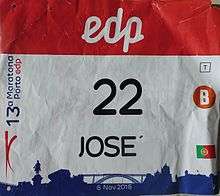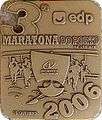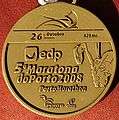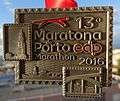Porto Marathon
The Porto Marathon is an annual marathon race in the city of Porto, Portugal, held in October or November, since 2004.
| Porto Marathon | |
|---|---|
 Porto Marathon | |
| Date | November |
| Location | Porto, Portugal |
| Event type | Road |
| Distance | Marathon |
| Primary sponsor | EDP |
| Established | 2004 |
| Course records | Men: 2:09:05 (2018) Women: 2:26:58 (2017) |
| Official site | Porto Marathon |
| Participants | 3,836 (2019) 4,657 (2018) |
Along with the marathon, several races of shorter distances are arranged as well. The marathon is sponsored by Energias de Portugal.
In 2009, 857 athletes competed the marathon. In 2010, 1180 athletes competed the marathon. In 2013, 2755 athletes competed the marathon, becoming the largest marathon in Portugal.
The 2020 edition of the race was postponed to 2021 due to the coronavirus pandemic, with all registrants given the option of transferring their entry to another runner or to 2022.[1]
Winners and finishers
Key: Course record
| Year | Finishers | Men's winner | Time[lower-alpha 1] | Women's winner | Time[lower-alpha 1] |
|---|---|---|---|---|---|
| 2019 | 3836 | 2:09:08 | 2:33:38 | ||
| 2018 | 4678 | 2:09:05 | 2:30:13 | ||
| 2017 | 4584 | 2:11:34 | 2:26:58 | ||
| 2016 | 4752 | 2:11:48 | 2:29:13 | ||
| 2015 | 4558 | 2:14:04 | 2:47:59 | ||
| 2014 | 4042 | 2:13:10 | 2:31:54 | ||
| 2013 | 2755 | 2:13:04 | 2:37:47 | ||
| 2012 | 1668 | 2:12:14 | 2:39:51 | ||
| 2011 | 1545 | 2:09:51 | 2:41:24 | ||
| 2010 | 1180 | 2:14:25 | 2:37:49 | ||
| 2009 | 857 | 2:13:12 | 2:30:40 | ||
| 2008 | 583 | 2:11:08 | 2:35:31 | ||
| 2007 | 412 | 2:15:12 | 2:31:31 | ||
| 2006 | 373 | 2:09:52 | 2:57:35 | ||
| 2005 | 310 | 2:22:27 | 2:45:09 | ||
| 2004 | 317 | 2:13:57 | 2:58:09 |
Gallery
| Wikimedia Commons has media related to Porto Marathon. |
- Marathon 2005 medal
 Marathon 2006 medal
Marathon 2006 medal- Marathon 2007 medal
 Marathon 2008 medal
Marathon 2008 medal Marathon 2016 medal
Marathon 2016 medal
Notes
gollark: Remove your teeth.
gollark: GTech™ house-uncausing confectioneries™.
gollark: Evolution has designed a lot of bad design into humans.
gollark: Yes.
gollark: K?
References
- "Comunicado". Maratona do Porto. June 8, 2020. Archived from the original on 2020-08-13.
This article is issued from Wikipedia. The text is licensed under Creative Commons - Attribution - Sharealike. Additional terms may apply for the media files.